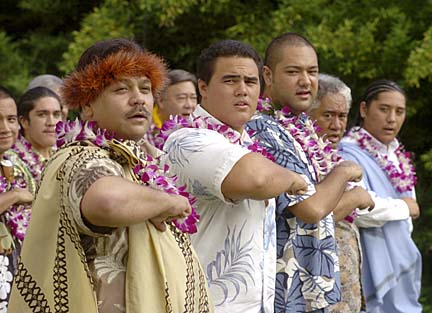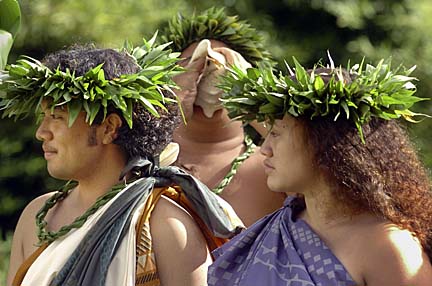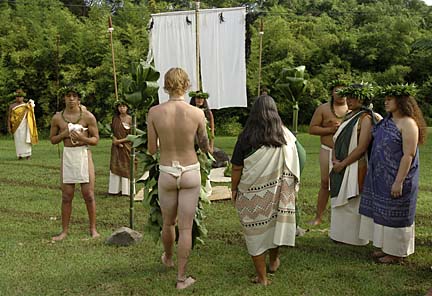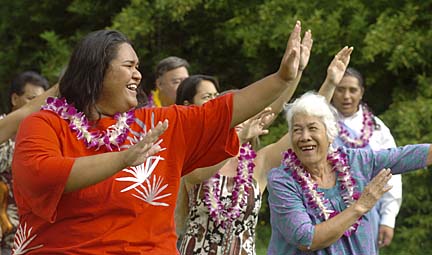

|
Makahiki rites
expand on Oahu
Makahiki participants began a welcoming chant in Hawaiian, and a crowd of about 100 fell silent and respectful. Two students in malos, or loincloths, blew steady blasts from conch shells.
And a ceremony unfolded that was modeled after festivals held centuries ago before Western contact with Hawaii.
Three malo-clad warriors with spears entered the area in procession, ahead of a white banner representing Lono, the Hawaiian god of peace, prosperity, fertility and healing. Kapono Souza, a Windward resident instrumental in makahiki ceremonies on nearby Mokapu Peninsula for several years, carried the banner.
"Makahiki is a celebration of peace and prosperity and all the good things in Hawaii. And Lono presided over the good side of Hawaiian life," said Kalani Meinecke, a Windward Community College associate professor of Hawaiian.
Celebrants at the first makahiki opening ceremony at the Windward campus on Thursday ranged from keiki to kupuna basking in the ongoing revival of Hawaiian culture. The festival -- one of several to herald the start of the makahiki season -- featured cultural activities, dance, food and games.
In early Hawaii the makahiki was a festival time after the harvest season when wars were put on hold, sporting competitions were organized between villages and chiefs collected their tribute or taxes from the common folks.
In recent years a number of people have been reviving the observance of makahiki, said Leimomi Kekina Dierks, a Polynesian voyaging instructor who helped organize recent events at the college, which is in the Heeia ahupuaa.

Kumu Steven Helela, above front, led his class in a chant during the ceremony.
"It's growing," Aila said. "I'm happy to hear that they had one at Windward.
"I think at the core is a resurgence of Hawaiian culture and a desire to understand Hawaiian culture," Aila continued. "And what makes it attractive for the present context is the message (of makahiki). It's a time of peace. It's a time of taking stock of the good things we have."
In old Hawaii, war and politics were kapu (forbidden) during the November-to-February season, while many other prohibitions were lifted and the common man and woman enjoyed more freedom to work less, play more and mingle more socially, according to the book "Ancient Hawaii," by Herb Kawainui Kane.
On Thursday, two days of rain had muddied the lawn east of Hale A'o, Windward Community College's home for Hawaiian language and culture classes. The Koolau Mountains stood razor sharp against a clear, blue sky, and the mood on the ground was festive and expectant.

The makahiki ceremony at Windward Community College started Thursday with the blowing of the pu by Kaleopa‘a Kamakea-Ohelo and Safea Kahiapo (not shown). Also pictured are Kalani Kuloloia, left, and Nanikehau Keama.
Student Victor Pulsifer, above left, and Kumu Leimomi Dierks offered hookupu during the ceremony.
An audience of about 100 faced a neat ahu (altar) of lava rock, topped with ki (ti) leaves and a carved wooden pig's head.
Meinecke said that at such makahikis, the bounty of the land was shown via tributes, or taxes, collected for the chief by the konohiki (headman) of each ahupuaa (land division) of an island.
The centerpiece of the makahiki ceremony Thursday was the presentation of hookupu (tributes). Gifts such as kalo (taro), ki leaf, sugar cane and kukui saplings were laid before the stone altar, with Lono's banner flying behind. Many participants, such as Hawaiian-language students, gave gifts of hula or chant.
One chant presented by the intermediate and high school students from Hakipu'u charter school allowed them to boast of their homeland. Their chant also promised to care for the land, said kumu Steven Helela.
"We chanted about the Koolau Mountains, the rain, the elements, about Lono and about the people of Hawaii," said Hakipu'u eighth-grader Kona Yam.

Paula Fuga, left, was among students of the intermediate Hawaiian language class who offered a chant.
Most people attending the event had connections to the Windward side of Oahu or to the community college.
Donna Ann Kamehaiku Camvel traces her roots on the Windward side to before the Great Mahele, the division of land that allowed for private ownership. Her great-uncle Sam Lono started reviving cultural practices on the Mokapu Peninsula between Kaneohe and Kailua in 1985, she said.
"We need to do this," Camvel said. "We need to establish practices so that kids are exposed to our culture. I anticipate that it will be here (at Windward Community College) next year. I expect to make hookupu for Lono from the place where I live."